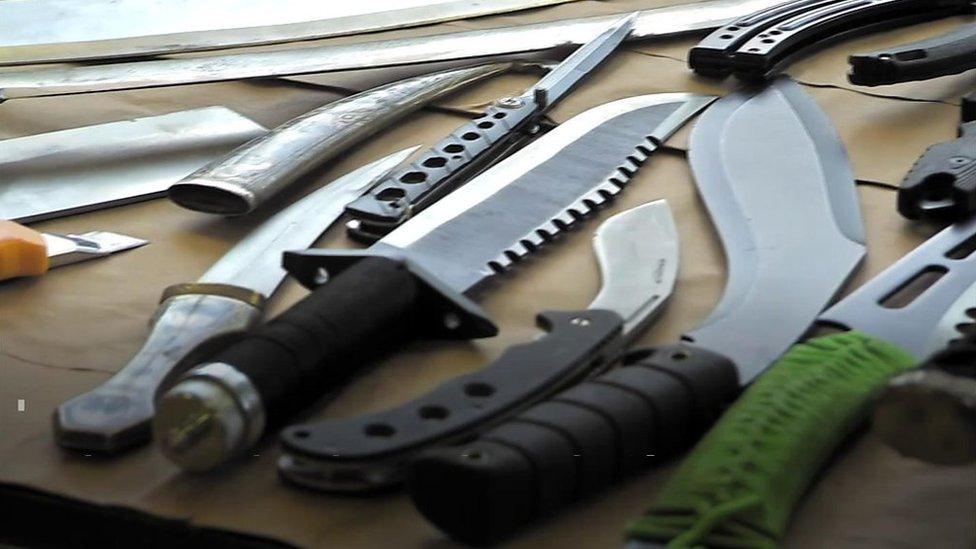Life in a gang: 'You don't know who's gonna die next'
- Published
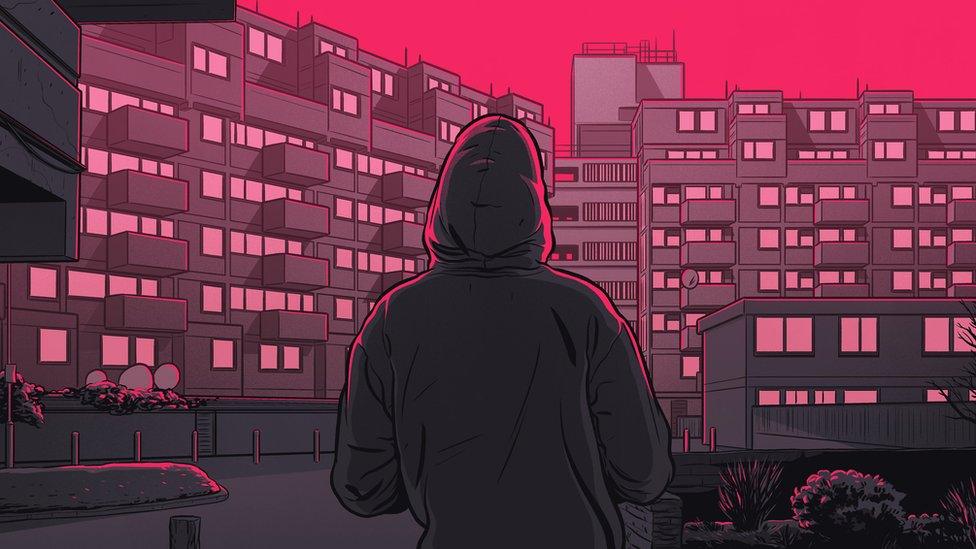
"If you don't prove yourself you're gonna get stepped on. You can't be a wasteman."
Yusuf's been in a gang since he was 15. He wears a stab vest when he leaves the flat he shares with his mum and carries a knife in his boxers because he fears he'll be killed if he can't defend himself.
"I'd rather be judged by 12 than carried by six," he says, borrowing a Roddy Ricch lyric to make his point.
Homelessness and domestic abuse feature heavily in Yusuf's past and he reckons there's an "80/20 chance" his future will involve prison.
The 17-year-old - one of London's most notorious gang members - is speaking to Radio 1 Newsbeat in a London youth hub.
Sitting on a white plastic chair beside his youth worker, Yusuf reels off some of the crimes he's been accused of - carrying acid, attempted murder, arming himself with a knife.
It's the first of a number of chats we had with the teenager, as we spent six months last year inside an east London unit set up to tackle gang crime.
As we knocked on doors with case workers and walked around Hackney estates with police who are on first name terms with gang members, we started to uncover what life is like for these young people.
They told us about stabbings, fights over "inherited beef" and the meticulous planning that goes into journeys to avoid running into rivals.
"One minute I'm going to the shop with my mate, the next minute I hear he's been stabbed," one 15-year-old says.
Like Yusuf, he regularly wears a stab vest underneath his clothes. He tells us he's rarely in bed before 03:00 and struggles to get up in the morning.
"Every other day police knock at the door," an 18-year-old says.
He's recently been arrested over a murder, but he's been released. He speaks plainly about being knifed in the leg.
"It was like a stab. Knife, blood. Couple of stitches."
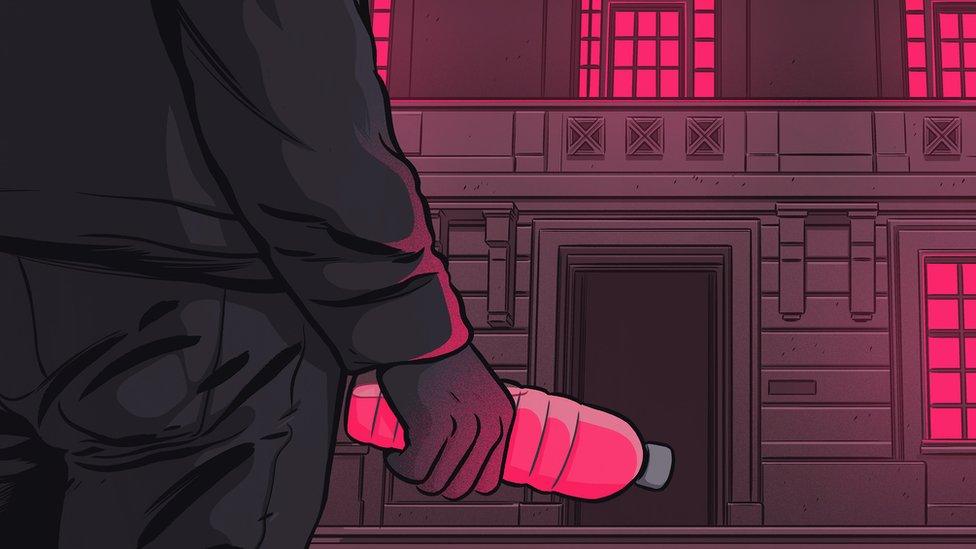
As we chat he constantly answers texts and calls on two phones. We later hear he's been jailed for county lines drug dealing.
He tells us he'd like to rewind.
"I'd go back in time. I know how everything is gonna end up. I'm here in my yard, it's safe. It's not safe out there."
So how did these young men get here?
Yusuf says most of the boys he started secondary school with are now in gangs.
'I gave up'
He once dreamed of being a footballer, but says he was let down by school and a government that "only cares about itself".
"They're not talking to the people in the council estates, they're talking to people in Chelsea," he says.
He didn't have to look far for a different path.
"I gave up on myself. In the borough like, this is the life. You don't need to look for it, it's there."

What is the gangs unit?
The idea behind the Hackney Integrated Gangs Unit- set up 10 years ago - was to bring all the people involved in working with gang crime together. Information is shared between police, probation officers, youth offending workers and mentors, who are often ex-gang members and they all sit in the same office.
There also someone from the Department for Work and Pensions, to help with jobs and benefits.
Staff at the unit offer all kinds of support for young people in the community, from "holding their hand" at a doctor's appointment to booking taxis to take them to school.

PC Jamie Preston says the teenagers who end up in gangs are often - not always - from poor backgrounds.
"They've usually not got much family, no money and they're living in London where you're surrounded by wealth. Rich people, flashy cars and all these kids want that," says PC Preston.
"You've got young males from estates who've probably got a single-parent income, living in horrible conditions, no money. They see these older males with thousands of pounds in their pocket and they ask them to do something and give them money for it.
"It's a no brainer, of course they're going to do it and this is how they get exploited."
Yusuf's mentor - part of the team at the unit - fills us in on some of his background.
He's been run over by a rival gang, caught with a sword and found in a house where drugs were being sold in Devon. He's been arrested a number of times.
Youth worker Damion Roberts says: "He's put himself in that limelight - he wants everyone to know he's a very aggressive young man. He's putting fear in other people's minds. He's becoming very aggressive in this culture."
'I feel like Superman'
Yusuf tells us he doesn't want to hurt people but wouldn't hesitate to stab someone if he felt he needed to.
"No-one carries it for fashion - it's not for show. For me it's for my defence, if the time came I'd 100% be prepared to use it. It's either me or them."
"I'd rather be in jail than dead, that's the reality."
Carrying a weapon makes him feel powerful, he admits.
"Like Superman - until it's time to run."
Yusuf's gang is his family and he'd do anything to protect them.
"I'm not saying I've stabbed someone. [But] in the future or whatever, I've got their back."

London's gangs matrix
When we met Yusuf he was on the Met Police's list of gang members, external and was number one on the Hackney unit's list. The gangs violence matrix was set up after the riots in 2011 and is used by officers to identify people likely to be involved in gang crime in London.
Once on the list, names are assigned a red, amber or green rating. But it has been controversial - 374 people were removed from the matrix this year when the UK's data watchdog found it breached data protection laws.

Close bonds are a common feature of the gang mentality, PC Preston says.
"At the same time as being a gang, it's like a family to them. If you've got no family, you've been in care, no-one's ever bothered about you and you've got a group of males who look after you, fight for you, give you money - it is like a family.
"That's what they actually crave, someone to look after them. And obviously they can make a lot of money at the same time."
Damion says similar.
"It's a sense of love and friendship that's supposed to be in the home but it's outside the home."
'People are dying'
Yusuf describes clashes with rival gangs as "war" and says he tries to get into that mindset.
"People get shot at, stabbed, people are dying. Just gotta think of it like this, 'I'm a soldier, soldiers do it [kill], if a soldier can do it I can do it.'"
He says he only feels safe at home or at the youth hub. His days are filled with "hyper vigilance" and "paranoia".
"You don't know what you're gonna hear. Who's gonna die next."
He sees threats everywhere.
"I don't like normal cars, speeding cars, cars going the wrong way up a one-way, tints, black cars, old cars, loud cars. I don't like dodgy licence plates."
He wants out.
"You want to leave. It's a sad life. There's nothing to be glamorised, people die, people die you know. Everybody wants to leave it. It's just about timing."
For Michael, that time came after 12 years in and out of custody for drugs offences and robbery.
He was first sent to a youth offender institution at just 13 years old.
"I felt like it just reminded me of a youth centre with people I didn't know that I got to know. Besides that, that was it, you just had a bedtime and you couldn't leave and I didn't even think that bothered me.
"Six months later, I got out."
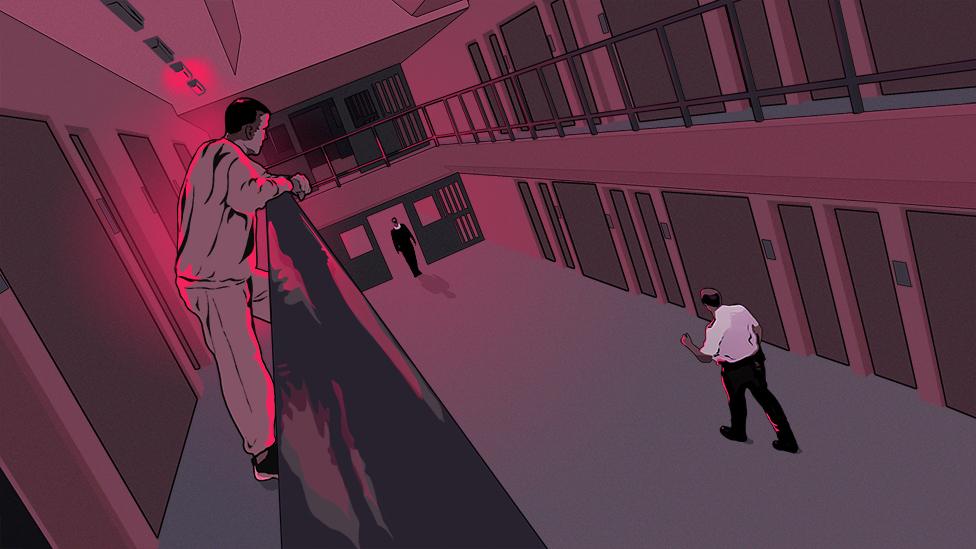
Now 26, he says crime was "just a way of life" and when asked if he ever felt bad or remorseful, he says: "Nah, I need to eat - that's what you're thinking."
When we meet him he's working a 9-5 job and he's been out of prison for eight months.
"Dealing drugs - running from the feds. I can't be doing this. I can't be running."
He says he can't quite believe how much spare time he now has. Being in a gang is 24-7.
"I feel more at ease now."
Michael has changed his life but he knows it's not easy getting others to do the same.
He tells us the kind of things designed to steer young gang members away from the streets - like mentors, day trips and restaurant outings - didn't stop him dealing drugs.
PC Preston puts it simply.
"As long as there is drugs and poverty, we'll always have a gang problem."
At the gangs unit, analyst Mani says helping people to get out of the gangs lifestyle is "a long hard slog" and can take years.
"It's a difficult lifestyle to get out of once you're fully entrenched. And actually, what we need to do is say to that young person, 'We're not going to leave you'."
That's what happened for Michael, who says he owes a lot to his probation officer at the unit.
"Things are going well and I still got her... still by my side. She's like family... I can't even argue with her, man."
Michael now wants to go into prisons to talk to young people like him. He's even speaking to his MP about it.
And what about Yusuf?
Our final chat with him is ahead of his sentencing for carrying a knife and taking acid into a council building.
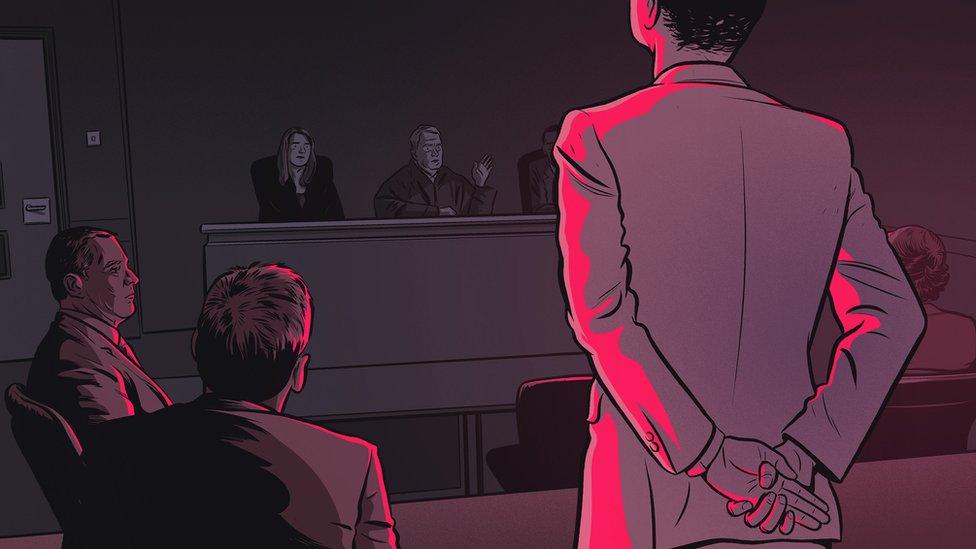
He tells us his mindset has shifted.
"The way I think is different. If I carry [a weapon] now and get stopped they know my face. Before, carrying is carrying. There's other ways to feel safe - planning what times I go out and what route. My decision making is different, I'm just gonna be more smart.
"I can't be getting caught with a sword and stuff, that's done"
Six days before Christmas, he stands before magistrates in a suit bought for him on a day out with his case worker, hoping if he's jailed he'll be out before his 18th birthday. He's told his mum not to come - he doesn't want her to see him in the dock - but she calls incessantly.
Magistrates give him a 12-month referral order - which means he will stay under the supervision of a youth offending team - and he calls a friend.
"Come get me - I didn't go down."
A year on and PC Preston says Yusuf's not been arrested or come to police notice since. He's still on the gangs matrix and will stay there until his criminal behaviour order ends next December.
PC Preston says officers will visit him once a month to check in and "ask him how he's getting on."
"He's enrolled in college - I believe he's attending regularly and doing well," he tells us. "He seems to be turning his life around."
Some names in this article have been changed to protect the identity of contributors.
Related topics
- Published28 February 2019
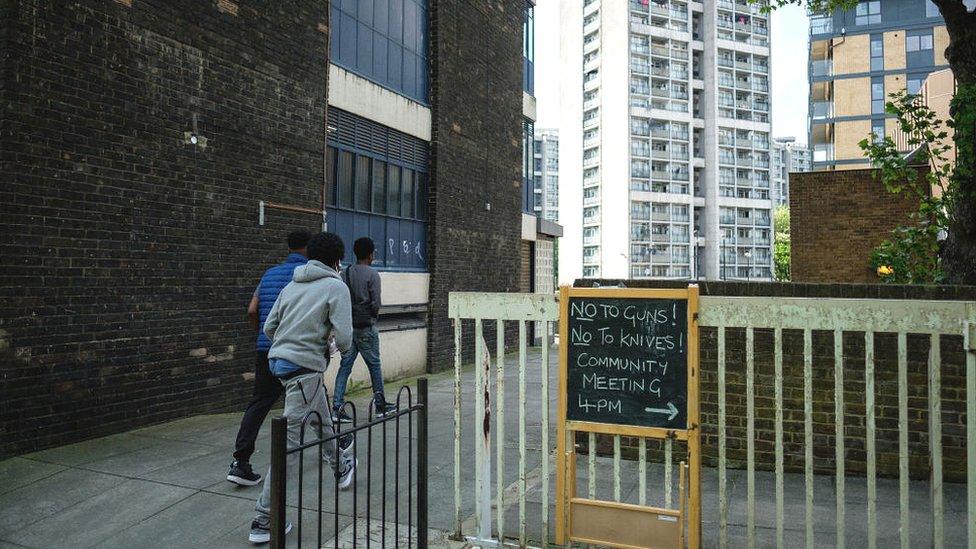
- Published9 March 2019
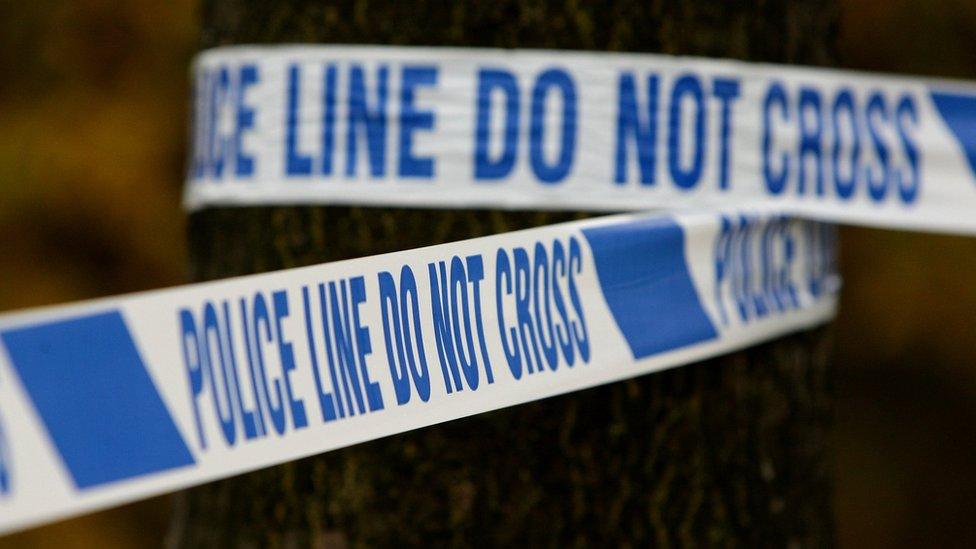
- Published14 July 2019
